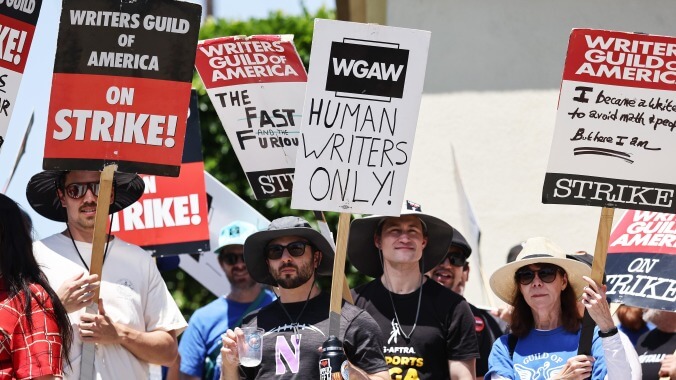Judge rules that strictly AI-generated artworks can't be copyrighted
The messy situation surrounding the "authorship" of AI art has taken another turn

In a decision that could have wide-ranging impacts on the film and television industry—and most other creative arts, honestly, as the techniques involved further infiltrate a variety of artistic disciplines—a U.S. judge has ruled that artwork generated solely by “artificial intelligence” cannot be copyrighted.
The ruling, from U.S. District Judge Beryl Howell, comes after AI Guy Dr. Stephen Thaler took issue with a ruling from the U.S. Copyright Office, which said that an AI-generated image titled “A Recent Entrance To Paradise” couldn’t have a machine listed as its creator—and, thus, that Thaler couldn’t own the copyright under “work for hire” protections as the client commissioning it. (The office has ruled that works where a human has “selected or arranged” the art in question in a “sufficiently creative way that the resulting work constitutes an original work of authorship” could qualify for copyright. It’s not clear if, say, generating a text prompt that an AI uses to make an image qualifies for that level of “selection or arrangement,” although it doesn’t really sound like it, at least to our laymans’ ears.)
In case it wasn’t clear, this all gets pretty philosophical pretty fast, with Judge Howell writing in her decision that “Human authorship is a bedrock requirement” for copyright, and that “Human involvement in, and ultimate creative control over, the work at issue was key to the conclusion that the new type of work fell within the bounds of copyright.” (And, yes, Howell did reference the infamous “monkey selfie” case, where courts played host to the question of who “owns” a photo physically taken by a monkey using a human photographer’s camera, writing that, “Plaintiff can point to no case in which a court has recognized copyright in a work originating with a non-human.”)
The ruling arrives as a whole host of emerging issues surround the use of AI in the arts—not least of which being its position as a sticking point in the current WGA and SAG-AFTRA strikes in Hollywood. (Which is to say nothing of the other side of the legal coin, as artists pursue ongoing lawsuits about the use of their art as training date for AI.) In all likelihood, films that use AI to create certain effects shots or, say, aid in the de-aging of actors, will probably skate by—and even something like the controversial AI art intro sequence to Marvel’s Secret Invasion was presumably tweaked and adjusted enough by human artists to possibly qualify under the “authorship” criteria. But as AI techniques become more prevalent, this question of authorship is only going to become more pressing—and more fiscally uncertain for all involved, especially as the government holds to the belief that copyright cannot exist without human creative output and intent behind it.
[via THR]